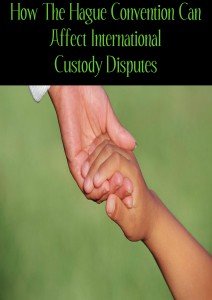 The increased mobility of people across international borders has resulted in many relationships that involve spouses and co-parents from different countries of origin. While custody disputes that occur after the breakdown of a marriage are often difficult, international custody cases that involve a parent from a foreign country complicate matters further because the law and governmental authorities from two different jurisdictions are involved in the dispute. However, the Hague Convention on International Child Abduction was created to provide assistance with situations where a parent unilaterally decides to take a child back to the parent’s country of origin. Because international custody disputes are increasingly common given the high number of marriages and parents from different countries, we have provided answers to three of the most important questions about parental custody cases involving removal of minor children by a parent.
The increased mobility of people across international borders has resulted in many relationships that involve spouses and co-parents from different countries of origin. While custody disputes that occur after the breakdown of a marriage are often difficult, international custody cases that involve a parent from a foreign country complicate matters further because the law and governmental authorities from two different jurisdictions are involved in the dispute. However, the Hague Convention on International Child Abduction was created to provide assistance with situations where a parent unilaterally decides to take a child back to the parent’s country of origin. Because international custody disputes are increasingly common given the high number of marriages and parents from different countries, we have provided answers to three of the most important questions about parental custody cases involving removal of minor children by a parent.
What is the Hague Convention designed to accomplish?
The Hague Convention is a “multilateral treaty” that is designed to protect children from the detrimental effects of child abduction and parental kidnapping by providing a procedure to facilitate the prompt return of children to the country from which the child was abducted. The Hague Convention provides a procedure that circumvents the potential conflict between different the disparate laws, standards, and procedures of the signatory countries.
How common are international custody cases involving one parent abducting the child and returning to the country of origin?
A study conducted by Cardiff Law School in the UK found that the number of Hague Convention proceedings to obtain the return of children abducted by a parent have increased by 45 percent since 2003. The U.S. State Department indicates that the cases of international child custody disputes involving the unilateral removal of a child to a foreign country have doubled since 2006. In 2012, approximately 1,135 children were involved in cases with Hague Convention applications. The challenges in an international custody dispute are reflected by the fact that only 436 of these children were returned to the U.S.
What procedures are involved in a Hague Convention application?
The custody orders and rights of parents are not the controlling factor in Hague Convention cases, rather the focus is on the notion of “habitual residence.” The objective under the treaty is the return of the child to the country from which the child was taken as opposed to returning the child specifically to the left behind parent. The Hague Convention provides for return of the child to the country of habitual residence prior to the violation of the custody agreement by the offending parent. A parent cannot manipulate the determination of the country of habitual residence by removing a child to another country. The identification of the country of habitual residence is based on a factual inquiry that involves consideration of the settled nature of the child’s residence prior to removal leading to dispute, the mutual intentions of the parents, and the history of the child’s residence.
Interstate Custody Disputes: Which Court Has the Power to Make Parenting Plan Orders?
The above information is designed solely to illustrate general principles of law, and does not constitute a specific legal opinion on individual cases. We suggest that you contact experienced legal counsel for a specific opinion tailored to your individual circumstances.
If you have questions about international custody disputes, our experienced New Mexico Hague Convention Attorneys may be able to help. Jay Goodman & Associates offers a free consultation in our centrally located offices in Santa Fe and Albuquerque so that we can discuss your situation and answer your questions. Call us today to schedule your free consultation at (505) 989-8117 to learn about your rights and options.

Comments are closed